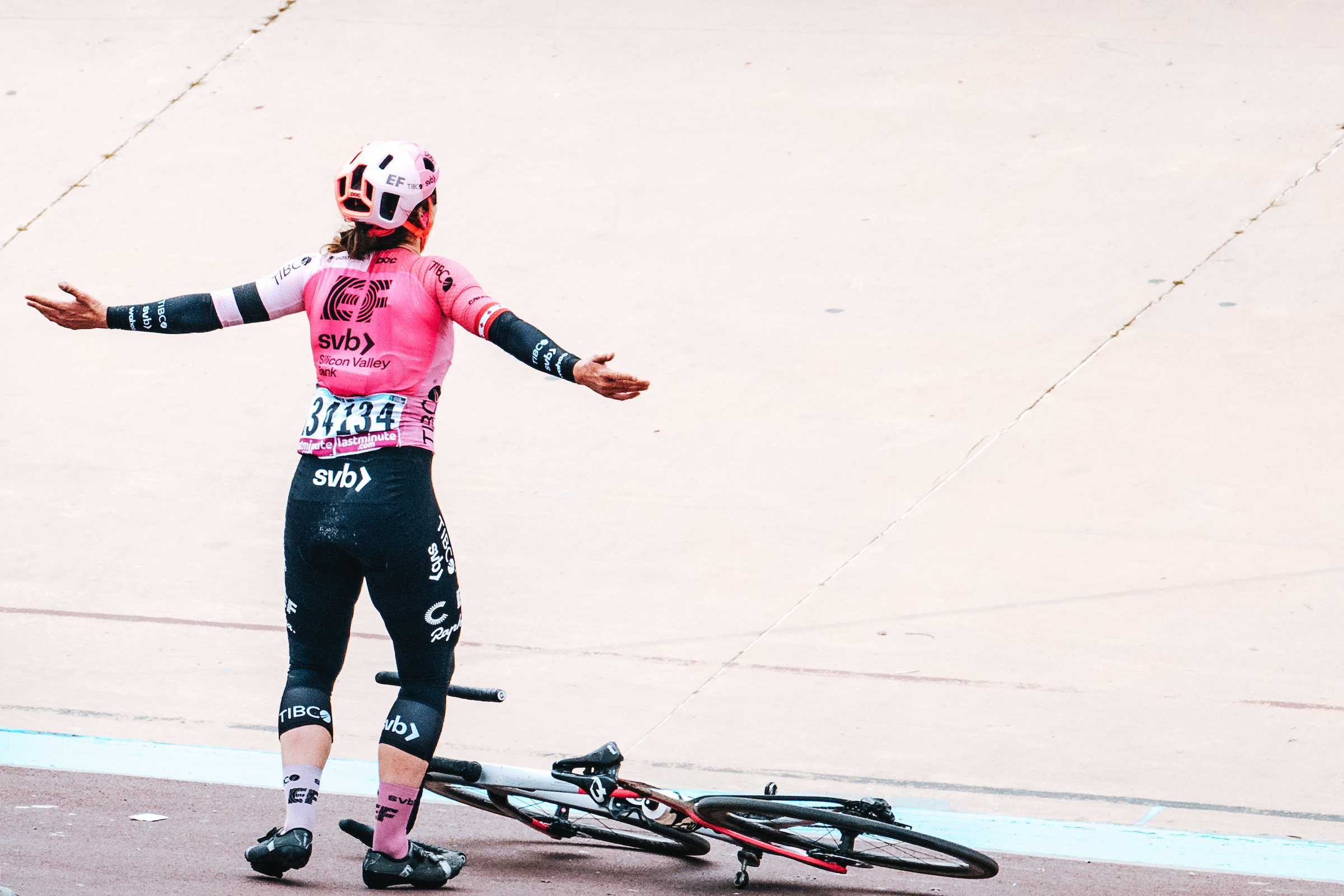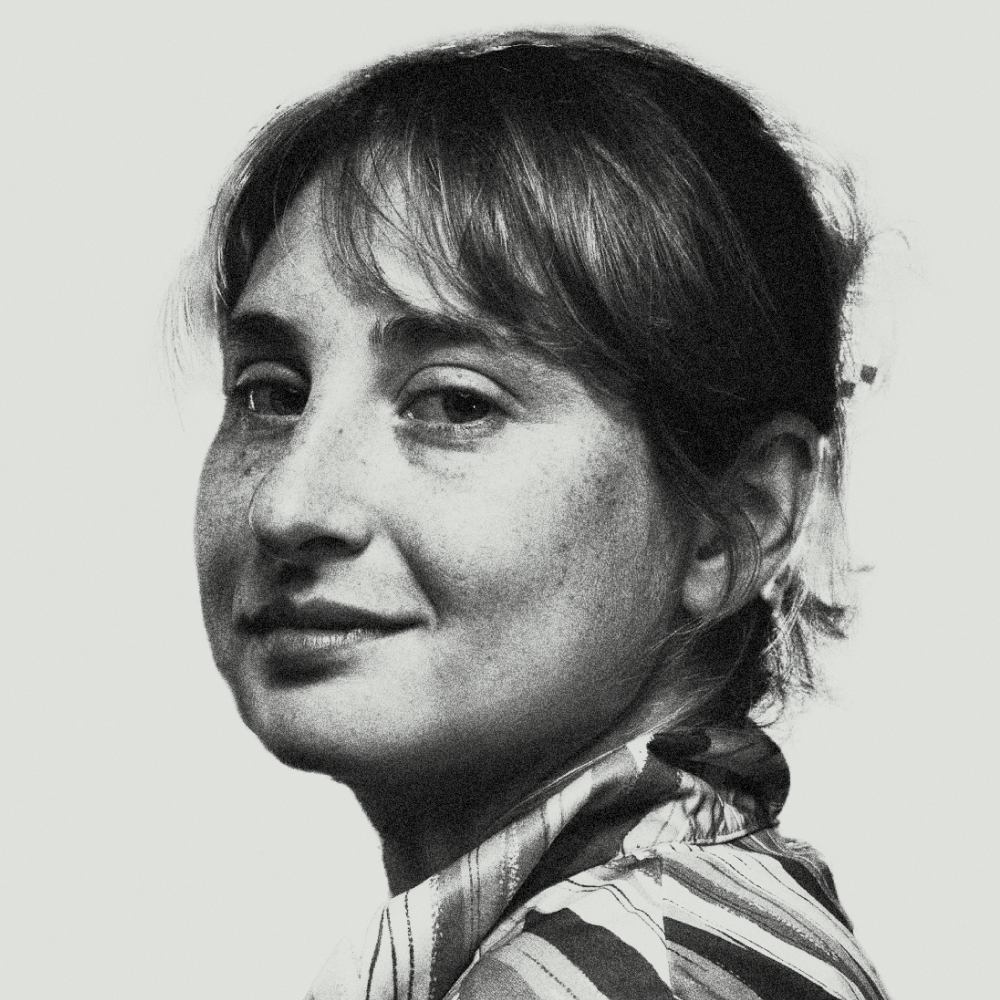When we get to Denain, it is empty. We have to get there early to pick up our accreditation. Then it’s a lot of waiting, but the waiting is easy because one can take in the procession of things. The maneuvering of the team busses, the parking of cars, the meeting of journalists who have not seen each other in some time. Slowly the crowds begin to gather beneath the cloudy sky. Parents bring their children, fans their autograph books, and soon the square is full of people. I wait for the Human Powered Health press officer, Oskar, to give me the okay to interview riders before, along with a soigneur named Sara, we set off, together, in their press van in pursuit of the race.
For the team, the day begins with tears as Audrey Cordon-Ragot embraces her former teammates at the embattled outfit Zaaf. “Be strong, girls,” she says. It is her first ride with her new HPH team, her shock transfer a welcome if surprising development after a difficult year for the French national champion.
For her, there is perhaps no harder early season race than Paris-Roubaix Femmes avec Zwift. She tells me she is a mix of “excited, tired, and relieved.” Each of these emotions is evident on her face, along with happiness, which she also expresses through a broad smile before disappearing into the crowd.

One gets the sense from the entire atmosphere that something profound is about to happen. There is a gravity to the proceedings, a nervousness, but also excitement. Mechanics double and triple-check their bikes, each tailored to riders’ Roubaix-specific preferences such as double bar tape and chain catchers. I examine all of them, their differences lost on someone like me.
The team cars pull into the street. Oskar and Sara rush back to the van, rain jackets in hand. It is time to go, to get to our spots on course to support the team. We pile into the van, turn right, and set off in search of cobblestones.
Sara and Oskar have a conversation among themselves. They don’t have race radio in the car and since coverage hasn’t started yet, they rely on a combination of ProCyclingStats, VeloViewer, and scouts they have stationed along the route who send information back via a WhatsApp chat. As a result, on the speakers is the song “No Scrubs.” Today we will tackle two sections of cobbles: Sector 17 (Hornaing a Wandignies) and the infamous Mons-en-Pévèle, Sector 11, rated five stars. (Sectors are counted backward from the start, so Sector 17 is actually the first.)
The journey to the cobbles feels especially long with no update as to what is going on. This is the nature of being in the race: you will only ever get a piecemeal, archaic view of the proceedings. To be in the race is to be in a state of unknowing.
The landscape outside is gray and dreary – endless fields bordered by budding trees as far as the eye can see, pockmarked every few kilometers by old, shabby houses and villages where life never changes. One blends into the other and the horizon does not end but merely shifts. Narrow roads split into roundabouts in the little towns, disorienting everyone not staring at a GPS.
Oskar breaks the silence to tell me that the cobbles are coming. And sure enough there is a horrific thud and a rumbling radiating from the ground into every surface of the van. Sara shifts the van’s position on the road but there is no relief. A pothole coaxes a squeak out of me. The road feels eternal – on each side there are irrigation ditches ensuring a singular, torturous path. If it is like this in a rather robust sprinter van, I can’t imagine what it must feel like on two skinny wheels. Finally, it’s over. I am informed this was the longest sector. You’re telling me.
Sara parks the van. The music changes to Lady Gaga. “We are a team of straight-up vibes,” Oskar says, and I believe him. The vibes are on. I leave the van and go walk up and down the Hornaing cobbles. I’ve never seen them before. They are huge, burly, knobby, undulating in cruel ways. I reach down and touch the smooth surface coated in a thin casing of mud and stupidly take a picture with my phone.
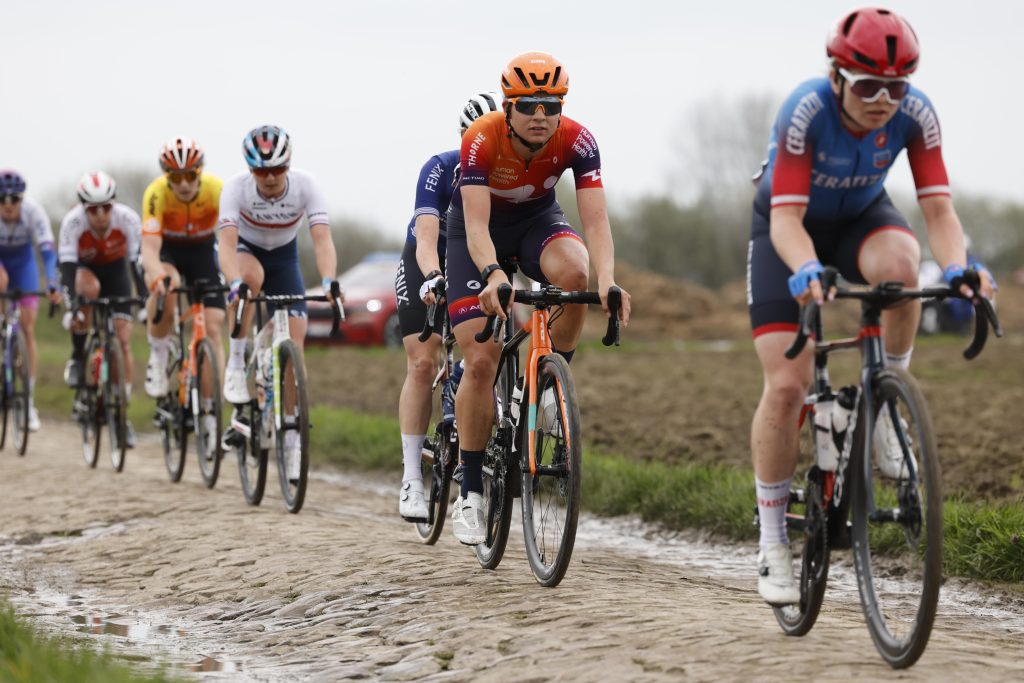
We receive news that one of the HPH riders, Jesse Vandenbulcke, is in a large breakaway (later I’ll learn this materialized thanks to a crash before the cobbles even started). I ask Oskar to tell me something about her, to give me the inside-team perspective. “She’s badass,” he smiles. “She’s a mom as well as a bike racer and her husband is out on the course helping us out. She’s had a quiet spring this season, but history says a quiet spring is good for Roubaix. She’s been threatening to do something major all season. She has the legs.”
The names of the other riders such as Lisa Klein of two-time winners Trek-Segafredo, and EF Education-Tibco-SVB’s Alison Jackson lend credence to the break’s deadly potential. It’s a waiting game now. I trace the little shapes on VeloViewer that represent the riders and their struggle. The sky dims once more.
Then the race comes forth at a trickle, one vehicle, two. Then the commissaire’s car, the helicopter, and, along the ridge of the distant landscape the specks of the riders. When they arrive, it is torrential. The thundering sound of bikes on cobbles, the focused look on each woman’s face – still fresh this early in the race. I’m almost run over by a DSM rider trying to squeeze as much out of the muddy section alongside the road as possible.
It’s fast and horrible and over. When the other groups of riders arrive, it’s fast and horrible and over for them too. It’s a separate race to get back on the parcours and everyone has to sprint back to the van, alongside all the other photographers and soigneurs, wheels in hand. That sprint back to the cars is almost as crazy as what just transpired on the cobbles. I slam the door and we try and pull onto the street only for the van to stall – thankfully it gives a little and purrs into action.
There’s a bit of a lull trying to get from sector 17 to sector 11. Without the race on in the background, it’s mostly wondering, thinking, refreshing live-tracker webpages. The rural backroads of France’s Nord department are no place to try and stream video. Fields stretch forever beneath the dark, threatening sky, seas of fresh spring green. Only through the appearance of industrial buildings beginning to populate the empty landscape does one remember that the race ends in and is thus nearing Roubaix.
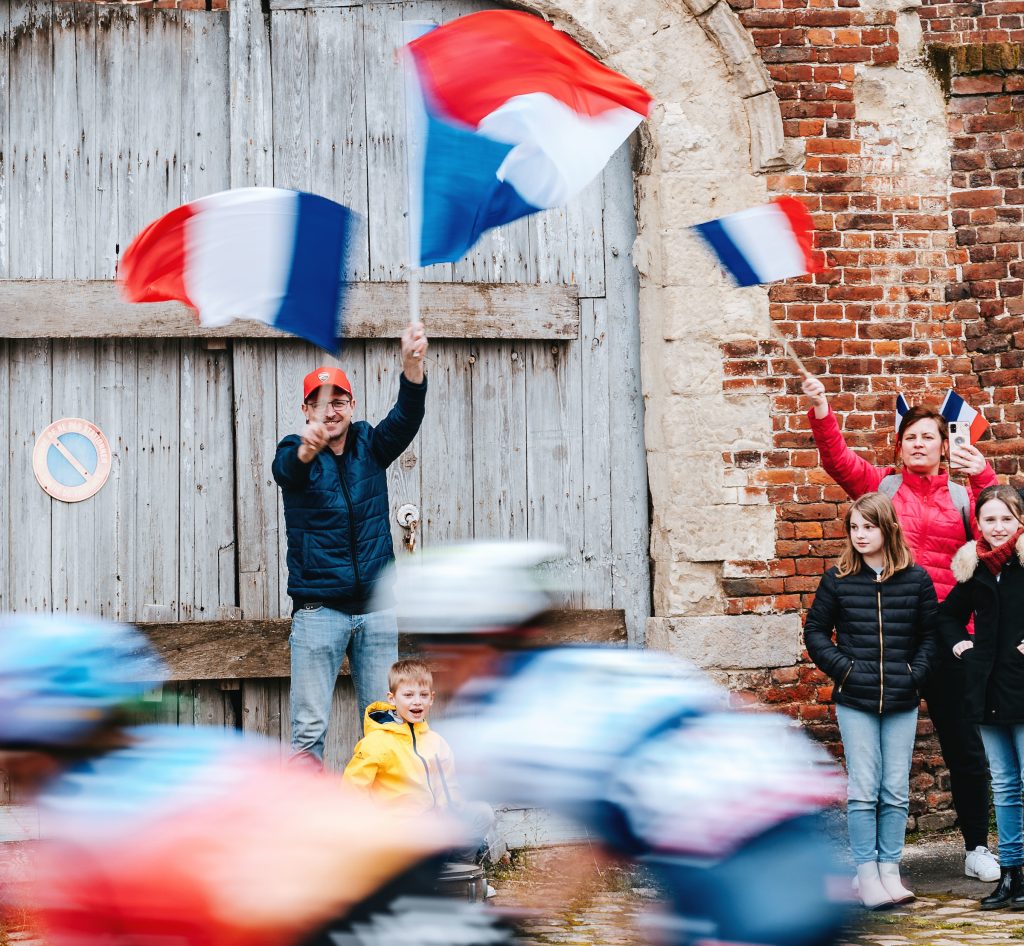
The race we see at Mons-en-Pévèle is a different race. There are more people out. It is easy to remember their faces in the waiting time. Boys cradling pet dogs. Middle-aged men wearing pristine Yeezys in the mud. Locals and foreigners, each telling their children about what they are about to witness.
What always astonishes me about cycling is that these roads are full of nothing. They are barren and empty and forsaken. And every year for one weekend they gain a specific use and holy meaning, tremble beneath vehicles and bicycles and the roars of fans only to become mundane and hollow again the day after.
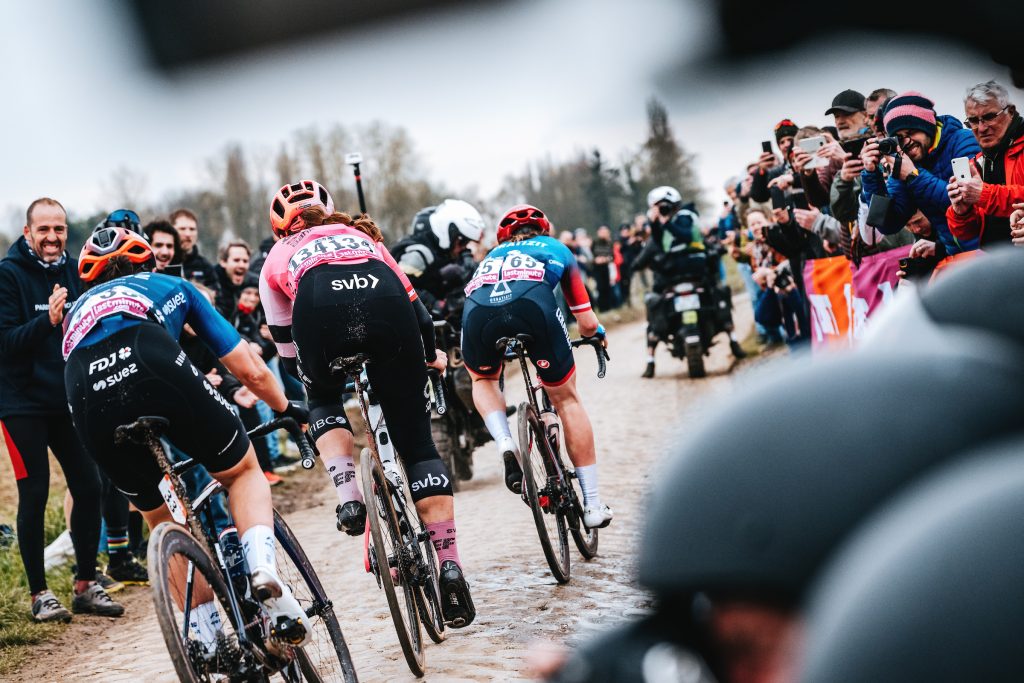
The breakaway has already been blown apart into sections, the chasing group not far behind. When the women approach this time, however, their faces are living pietas. Their bodies jolt and the vibrations traveling up their arms turn them to jelly. They are covered with filth and mud and the indignities of exhaustion – their suffering is total and visual and I find myself moved deeply by it, that pain mingled with sheer determination, violence born out of love. This is the essence of Paris-Roubaix, the paradoxical fantasy that keeps us coming back year after year. And just as soon as they pass, it’s another sprint to the van, shoes disgusting with grime.
Now the pictures start to come in through the phone – only slightly before cutting off again. The crash at 38 kilometers to go that stalls the chasing groups. The attack at 27 kilometers of young Katia Ragusa of Liv Cycling – a failed but memorable attempt. Then the pictures cut off and word of mouth takes over once more.
The drive to the velodrome is thwarted by everything possible, it seems. Gendarmes who don’t speak English. Traffic. Road furniture. The kilometers are ticking down. It’s 20. It’s 15. It’s 10 by the time we hit the final cobbled sector and Oskar is shouting GO GO THEY’RE THE GOOD COBBLES!

The race is coming. The sounds of the race erupt around. I’m going to miss it. I’m going to miss the end. I start running around that final corner into the velodrome, and I’m not a runner at all, and start kind of half-speed walking. The announcers in French, the cheers of the fans, the Roubaix velodrome in real life for the first time ever and I can’t even let it sink in because they’re three kilometers behind me.
I see enough on the Jumbotron to know the group containing Lotte Kopecky and Marianne Vos simply can’t – after so much toil – bridge the final gap of ten seconds to the remaining small group of breakaway riders which will enter the velodrome and give us a winner none of us expected. For each of these women it is surely becoming very real that they could have a day of unfathomable glory. I cannot imagine what must be running through their minds except the sheer unbridled adrenaline of the finish.
It’s a blur when they come into the velodrome. They pass by so fast it’s blistering. There’s a crash on the track, but no one’s looking to see who because the leaders are still going and they’re almost to the end, the end, and the only way I know who wins is that I hear the scream of the EF-TIBCO-SVB soigneur behind me. It must be Alison Jackson. It is Alison Jackson.
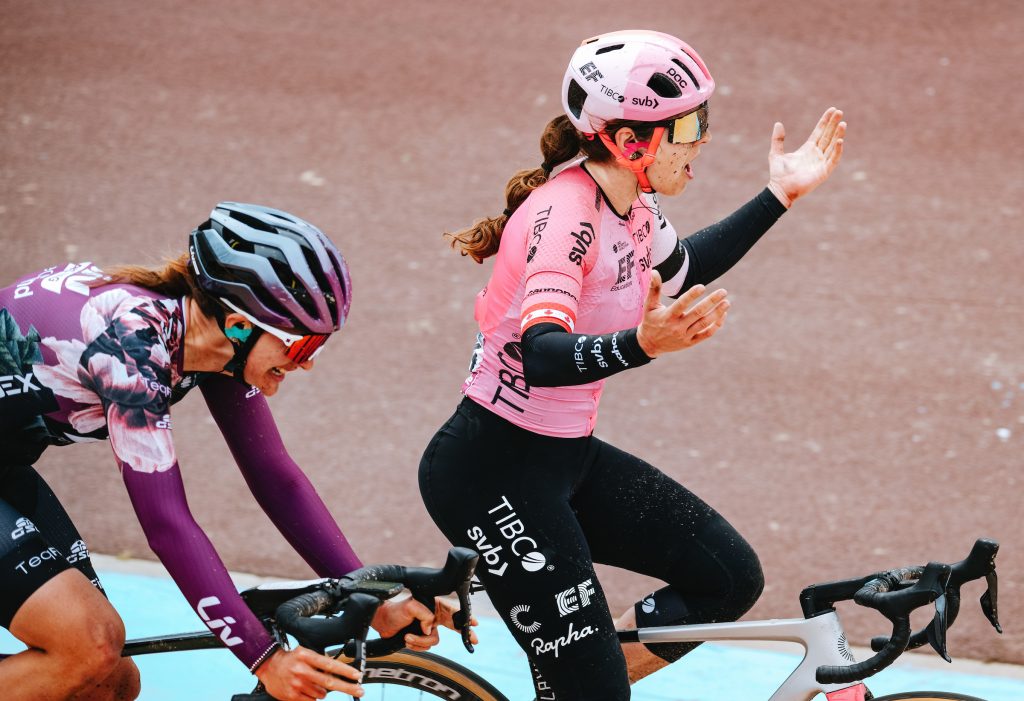
I’m stunned. Everyone there is stunned. The riders in the pursuing group, all of whom woke up with a certain destiny, surely are also stunned. The women slow to a halt. Second-place Liv rider Katia Ragusa, the same attacker as before, collapses on the astroturf and bursts into tears. I’m crying too. I’ve never seen such a sudden and human display of emotion before – a complete and total catharsis born from both the grief of losing and the profound realization of the monumental achievement of podiuming one of the most important races in the sport.
Everyone who comes into Roubaix seems prone to tears – tears that they’ve ridden it, tears that it’s over, tears for teammates and tears for a lost day. Jackson is whisked off to the TV cameras, her team celebrating, clad in pink. After seeing what I saw on those roads, their tears feel so real and so well-deserved. In the words of Vandenbulcke, “I enjoy [Paris-Roubaix] but maybe I will enjoy it in more two hours or something.”
Some emotions are more potent than others. I ask Ragusa what’s going through her mind. She says the word unbelievable over and over again. “This morning, we say, okay we try to go in a breakaway in order to anticipate all the sectors of pave, so we can take them with less stress, and we’ll see what will happen. Sorry, but what the fuck, I didn’t expect to be second in a cobbled classic. It’s unbelievable.”
I think that’s what’s so phenomenal about Paris-Roubaix. You will never know how the riders who set off in the morning will arrive in the afternoon. Everything can change in an instant, and what does change in an instant can form a powerful catalyst for a chain of events that have the potential to shape entire lives. No other bike race is quite like it.
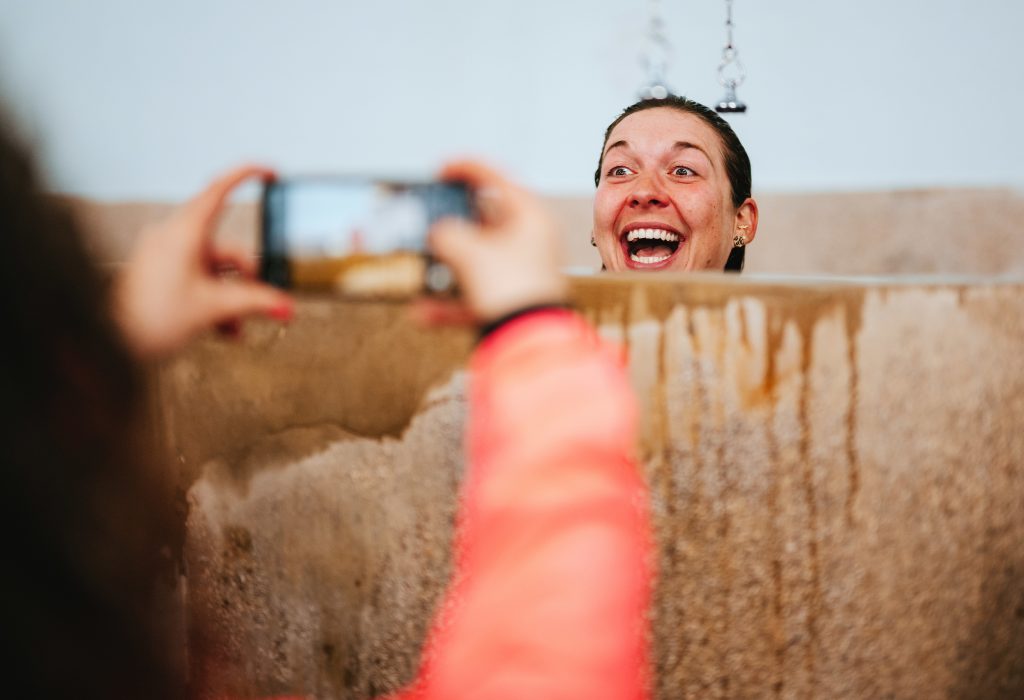
Just after the finish, a tear rolls down Alison Jackon’s cheek as she tells a TV interviewer about how she’s had a lot of dreams in bike racing, many of which just stayed dreams. Later at the press conference, a journalist asks Jackson what she would say if someone told her earlier that morning that she would win Roubaix. She grins.
“Sweet,” she says, and laughs.
Did we do a good job with this story?
